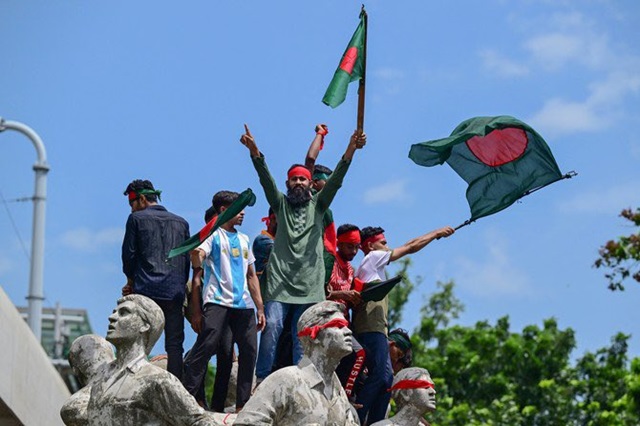The violent uprising in Bangladesh, organized by a section of students loyal to Islam and some Islamic extremists, coupled with the support of the Bangladesh army chief for the turn of events, resulted in a situation where the then Prime Minister, Hasina, had no choice but to leave Bangladesh.
In recent years, similar uprisings have occurred in several countries. In most of these cases, the result was chaos and confusion, with the country’s fortunes rapidly declining. However, there is an exception in the case of Sri Lanka, where, after the uprising, normalcy was somehow restored, and a party duly elected by the people assumed office. The question is whether Bangladesh, after the uprising, will follow the same path as Sri Lanka or face a situation like other countries where chaos has prevailed.
When such uprisings occur, led by a small group of people who take the law into their own hands and adopt violent methods, the silent majority in the country often remains as distant observers, though concerned about the situation.
In Bangladesh, those who organized the uprising do not appear to have any commitment to a specific economic philosophy or strategies for the country’s development. With the Prime Minister fleeing and no clear leader to take over, it seems the governance of the country has been handed over to Mohammad Yunus, who is seen as someone amenable to those in charge of the uprising and willing to accept their directives.
In the months following the uprising, there is evidence that Bangladesh’s economy has suffered, and the momentum achieved in recent years under Sheikh Hasina’s leadership seems to have been lost.
Several well-meaning projects, such as the partially completed nuclear project with Russian collaboration, are now being questioned. The long-term power supply arrangement with India’s Adani Group is also being reconsidered. There seems to be no logical justification for these decisions.
What is now being heard in Bangladesh is a focus on threatening minority communities, damaging their places of worship, and indulging in abusive rhetoric against India.
Clearly, Bangladesh is moving closer to Pakistan, which has almost declared itself as a sworn enemy of India. With the country now largely under the control of Islamic extremists, it is likely that Bangladesh will soon be declared an Islamic country, similar to Pakistan, dropping its credentials as a secular state.
With the economy of Bangladesh likely to decline due to confusion in decision-making and foreign exchange reserves dwindling, Bangladesh could become a fertile ground for China to launch its economic corridor project, which would inevitably drive the country into a deep debt burden, just as it has with Pakistan.
Those in charge of the Bangladesh government today are not representative of the people. What is happening in Bangladesh now is essentially rule by a coterie, lacking any clear direction, except for the goal of transforming the country into a fully-fledged Islamic state. This appears to be the primary objective.
India has so far reacted to the situation in Bangladesh with extreme caution, almost ignoring the constant hate speech against India. With the recent demand from the Bangladesh government that Sheikh Hasina be sent back to Bangladesh to face trial, which could likely result in her long-term imprisonment or even a death sentence, and with India expected to reject the request for her extradition, the relationship between the two countries will likely become more hostile in the coming weeks.
It seems that the coterie now in charge of the Bangladesh government lacks the wisdom to realize that, as a neighboring country, relations with India should not be soured beyond repair. There is already evidence of how crucial good relations with India are for Bangladesh, highlighted by the recent request for India to supply rice, despite the hostile statements being made against India.
With elections in Bangladesh unlikely for at least the next twelve months and the coterie-led government continuing, the future of Bangladesh is uncertain.
The silent majority in Bangladesh realizes this but seems to be helpless.

